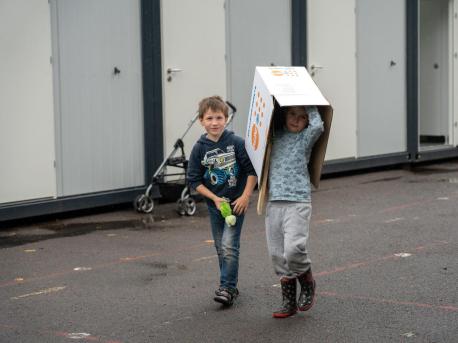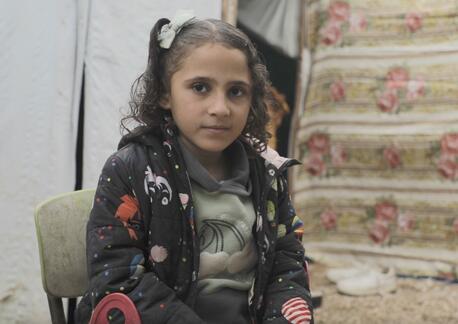
Humanitarian Cash Transfers Provide Vital Aid for Ukraine's Families
Since the start of the war, UNICEF has distributed $125 million in emergency cash assistance to families with children in Ukraine. The Spilno humanitarian cash transfer program delivers rapid, flexible funding that parents and guardians can use to meet their children's most urgent needs.
It has been six months since the war in Ukraine escalated in February 2022, plunging the nation's children and families into a waking nightmare. Children didn't start the war, but they remain caught in the crossfire, while all around them, the schools, hospitals and other civilian infrastructure on which they depend continue to be damaged or destroyed.
UNICEF has been working around the clock to support children and families in need, providing safe water, mental health and psychosocial support, learning supplies, access to formal and nonformal education, health care and other essential services. UNICEF estimates there are 5.2 million Ukrainian children in need of humanitarian aid.
This program is about helping families in a crisis do what they believe is best for their children.
To help vulnerable families cope during this extremely challenging time, UNICEF and Ukraine's Ministry of Social Policy launched a humanitarian cash transfer program in March 2022. Since then, the Spilno program has distributed $125 million and reached 350,000 children, including 35,000 with disabilities, living in 120,000 households across the country.
Families can register for assistance and receive a quick reply through an online platform; successful applicants receive an unconditional cash grant.
"This program is about helping families in a crisis do what they believe is best for their children," said Murat Sahin, UNICEF Representative in Ukraine. "No one is in a better position to decide how to get the most out of this support than a parent or guardian."

Vira, a mother of three from Zaporizhzhia oblast in eastern Ukraine, holds her youngest child close. When the family ran out of food, they baked bread out of flour her husband made by grinding chicken feed. Vira used money from UNICEF's Spilno cash assistance program to buy food and medicine for her children. © UNICEF/UN0678107/Filippov
The Spilno program prioritizes families with three or more children and those raising at least one child with a disability across Ukraine. The target beneficiary group was based on a 2020 child poverty study, which found that 47 percent of families in Ukraine were living in poverty. Among these, 81 percent of households with three or more children lived below the poverty line.
We were so desperate, we sold our rings just to buy some food.
Before the war escalated, Vira, her husband and their three children had been looking forward to picking fruit in their garden in Zaporizhzhia oblast, eastern Ukraine, caring for their newborn calves and vacationing by the sea. Instead, after 90 days of gunfire and intensive shelling, they fled their home and moved into a modular container town for displaced families in the western city of Lviv.
Their garden at home has died, their house has been abandoned and the beaches they were planning to visit are now the Ukrainian front line.
"When we ran out of food, we started baking bread. My husband was grinding the chicken feed to make flour. And we ate that bread. That lasted for a week or two," said Vira. "We were so desperate, we sold our rings just to buy some food.
“With the money we received through the Spilno cash assistance program, we have enough to eat and buy medication.” Vira and her husband are looking for work, and trying to adjust to their new reality.

Forced out of their homes by the war in Ukraine, these children and their families are currently living in temporary modular housing in Lviv. © UNICEF/UN0678120/Filippov
The Spilno cash transfer program would not be possible without funding provided by the Government of Italy, Spain, the Swedish International Development Agency, the United Nations Central Emergency Response Fund (CERF), and the European Union, as well as support from businesses and caring individuals from all around the world.
UNICEF has expanded its presence to 10 locations across Ukraine to reach children and families in urgent need of humanitarian support. Your contribution can make a difference. Please donate.
Top photo: Two children walk through rows of modular housing units set up in Lviv, western Ukraine, for families forced to evacuate their homes during the war. © UNICEF/UN0678118/Filippov
HOW TO HELP
There are many ways to make a difference
War, famine, poverty, natural disasters — threats to the world's children keep coming. But UNICEF won't stop working to keep children healthy and safe.
UNICEF works in over 190 countries and territories — more places than any other children's organization. UNICEF has the world's largest humanitarian warehouse and, when disaster strikes, can get supplies almost anywhere within 72 hours. Constantly innovating, always advocating for a better world for children, UNICEF works to ensure that every child can grow up healthy, educated, protected and respected.
Would you like to help give all children the opportunity to reach their full potential? There are many ways to get involved.





